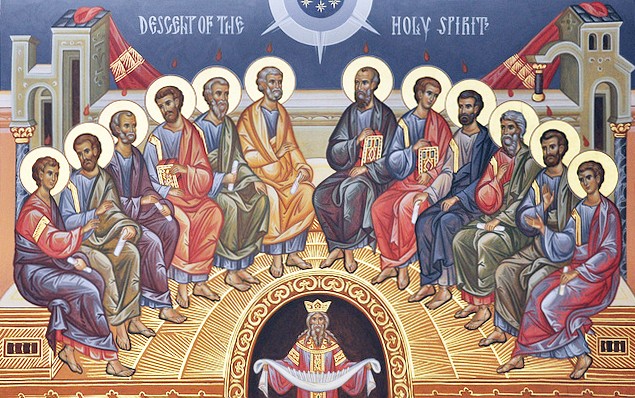Tongues of Fire: The Story of Pentecost
In the Jewish tradition, Shavuot is celebrated 50 days after Passover. Passover celebrates the exodus of the Israelites from slavery in Egypt, and Shavuot celebrates God’s gift of the 10 commandments to Moses. In the new covenant of the Messiah, the Passover event takes on its new meaning as the celebration of Christ’s death and resurrection, the “exodus” of men from this sinful world to the Kingdom of God. And in the New Testament as well, the Pentecostal feast is fulfilled and made new by the coming of the “new law,” the descent of the Holy Spirit upon the disciples of Christ.
In the biblical story of Pentecost, 50 days after the Resurrection, the Holy Spirit descended upon the apostles and the church of Jerusalem, during the Jewish feast of Shavuot. Jews traveled great distances to the Temple in Jerusalem to observe this festival, so there were people from all over the ancient world, speaking different languages and dialects, gathered together.
As the apostles mingled with this crowd, the gospel stories relate that the Holy Spirit descended on them as tongues of fire. They were enabled to preach to the assembled crowds, speaking to each person in a language he or she could understand bearing witness to Jesus as the risen Christ. This moment has traditionally been called the birthday of the church.
The word Pentecost comes from the Greek word pentekostos, which means “fiftieth day”. It is considered the birthday of the Christian church for two reasons. First, the descent of the Holy Spirit completed the Holy Trinity, which forms the basis of Christian theology. Second, it was from that time forward that the apostles began to spread their faith beyond their small group of Jerusalem followers.
The feast of Pentecost is not simply the celebration of an event which took place centuries ago. It is the celebration of what must happen and DOES happen to us in the Church today. We have all died and risen with the Messiah, and we have all received his Most Holy Spirit. We are the temples of the Holy Spirit. We, by our own membership in the Church, have received the “seal of the gift of the Holy Spirit” in the sacrament of chrismation. Pentecost has happened to us!
Blessed art Thou, O Christ our God, who hast revealed the fishermen as most wise by sending down upon them the Holy Spirit: through them Thou didst draw the world into Thy net. O Lover of Man, Glory to Thee (Troparion).
When the Most High came down and confused the tongues, he divided the nations. But when he distributed the tongues of fire, he called all to unity. Therefore, with one voice, we glorify the All-Holy Spirit! (Kontakion).
The Great Vespers of Pentecost evening features three long prayers at which the faithful kneel for the first time since Easter. The Monday after Pentecost is the feast of the Holy Spirit in the Orthodox Church, and the Sunday after Pentecost is the feast of All Saints. This is the logical liturgical sequence since the coming of the Holy Spirit is fulfilled in men by their becoming saints, and this is the very purpose of the creation and salvation of the world. “Thus says the Lord: Consecrate yourselves therefore, and be holy, for I your God am holy” (Lev 11.44–45, 1 Pet 1.15–16).
